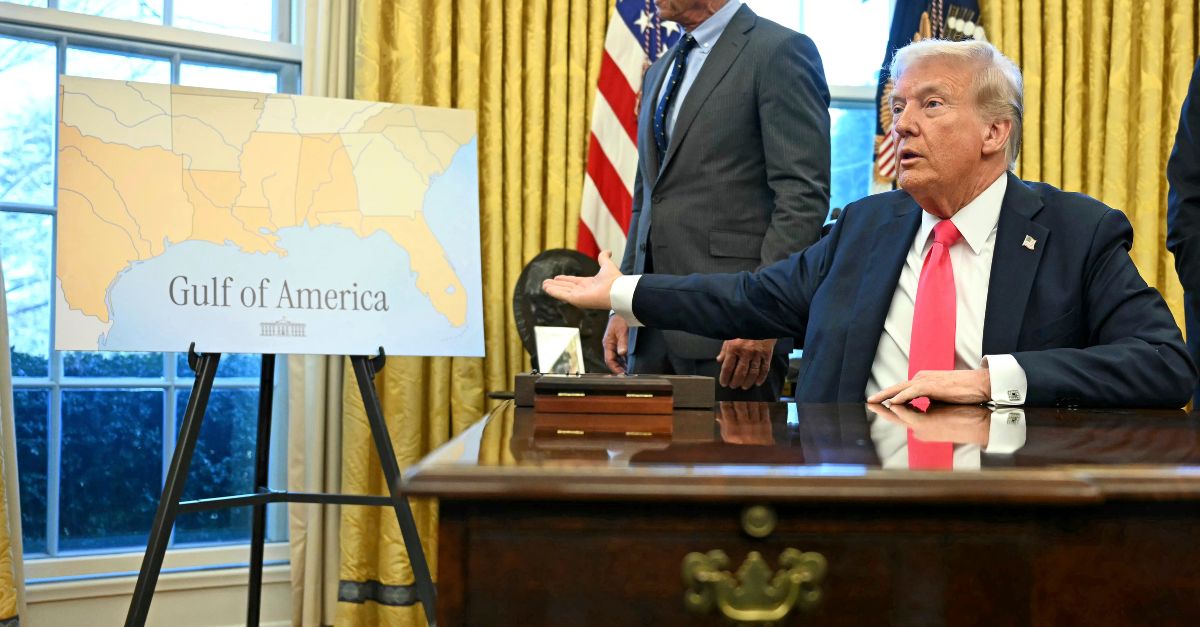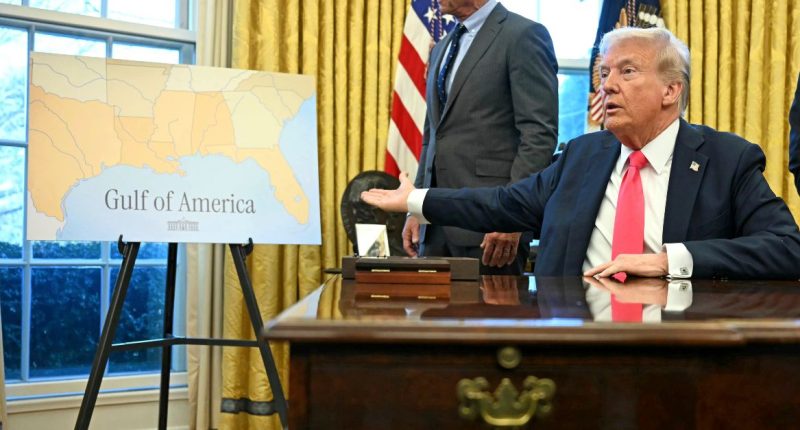
President Donald Trump gestures to a poster that says “Gulf of America” in the Oval Office at the White House in Washington, Tuesday, Feb. 25, 2025 (Pool via AP).
A federal judge in Washington, D.C., is forcing the Trump administration to let the Associated Press back into the White House press pool after it tried barring the news outlet over its refusal to refer to the Gulf of Mexico as the “Gulf of America.”
In a Tuesday court order, the judge said the media outlet was likely to prove it “suffered unlawful retaliation for exercising its speech rights.”
U.S. District Judge Trevor McFadden, a Donald Trump appointee who was put on the bench in 2017, agreed to grant a request by the AP for a preliminary injunction blocking the White House’s ban on its access to the Oval Office, East Room and other sites of press events. In a memorandum order, the judge reasoned that the government’s ban amounted to “impermissible viewpoint discrimination.”
“Access restrictions must be reasonable and not viewpoint based,” McFadden wrote. “While the AP does not have a constitutional right to enter the Oval Office, it does have a right to not be excluded because of its viewpoint. And the AP says that is exactly what is happening.”
On Feb. 11, Trump administration officials informed the AP its text-based reporters would be barred from entering certain areas as members of the White House press pool “unless the AP began referring to the Gulf of Mexico as the Gulf of America, following President Trump’s renaming of that body of water in Executive Order 14172,” which was titled, “Restoring Names That Honor American Greatness.”
Later, AP photographers were allegedly banned as well.
On Feb. 21, the AP filed a lawsuit in federal court in D.C. accusing the White House of engaging in “content- and viewpoint-based discrimination” in violation of the First Amendment. The complaint requested a temporary restraining order and asked the court to reverse the ban. An amended filing added the photographer ban to the complaint and pushed for a preliminary injunction.
Following a hearing in February, McFadden refused to grant the “extraordinary” relief of an injunction, but signaled that the administration would have a difficult time defending its decision when it came time to argue on the merits.
“It seems pretty clearly viewpoint discrimination,” McFadden said at the time.
In his Tuesday order, the judge said if the White House really wanted to, it could restrict access to reporters at every media outlet on Earth. Where the government goes wrong, McFadden said, is picking and choosing which ones to keep away based on press style.
“This injunction does not limit the various permissible reasons the Government may have for excluding journalists from limited-access events,” McFadden explained. “It does not mandate that all eligible journalists, or indeed any journalists at all, be given access to the President or nonpublic government spaces. It does not prohibit government officials from freely choosing which journalists to sit down with for interviews or which ones’ questions they answer. And it certainly does not prevent senior officials from publicly expressing their own views.”
More from Law&Crime: ‘Under established law’: Supreme Court nixes district court order demanding reinstatement of fired federal workers
The press pool is a nearly 144-year-old institution whose members have, for decades, been under the purview of the 111-year-old White House Correspondents Association (WHCA), a nonprofit famously responsible for its annual dinner. The concept of the pool itself, however, was essentially invented by the AP — with its reporters and photographers being White House media staples for years.
Trump administration officials have accused the outlet of refusing to “adhere to what the president believes is the law.” But McFadden, in his order, noted how several members of the original press pool are still using the term, “Gulf of Mexico,” and retaining access.
“The Government maintains that under these new procedures, ‘[t]here is no categorical ban on media outlets that are critical of the President or that refuse to use the proper name for the Gulf of America,”” McFadden wrote. “Indeed, it has continued to admit outlets to the pool, such as the New York Times, that ‘have been highly critical of the President and have continued to refer to the former name.’ In fact, all members of the original press pool have continued to use the Gulf of Mexico name while noting President Trump’s order. So why has the AP alone been penalized?”
Ultimately, the court agreed with the plaintiff’s claims that the government has “singled out the AP” due to its refusal to update the body of water’s name in its widely-used Stylebook, which the judge describes as an “influential” writing and editing guide.
“The AP seeks restored eligibility for admission to the press pool and limited-access press events, untainted by an impermissible viewpoint-based exclusion,” McFadden wrote. “That is all the Court orders today: For the Government to put the AP on an equal playing field as similarly situated outlets, despite the AP’s use of disfavored terminology.”
While the decision is a major win for the AP, McFadden noted how the Trump administration isn’t being blocked permanently from stripping AP’s access to the Oval Office, East Room or any other White House media event.
“The Court simply holds that under the First Amendment, if the Government opens its doors to some journalists — be it to the Oval Office, the East Room, or elsewhere — it cannot then shut those doors to other journalists because of their viewpoints,” the order reads. “The Constitution requires no less.”
The Trump appointed judge explained the AP will no longer be entitled to the “first in line every time” permanent press pool access the media outlet “enjoyed under the WHCA.” The court’s order does also not prohibit the Trump administration from “freely choosing which journalists to sit down with for interviews or which ones’ questions they answer” during press events, the judge added.
“But (the AP) cannot be treated worse than its peer wire services either,” McFadden concluded. “The Court merely declares that the AP’s exclusion has been contrary to the First Amendment, and it enjoins the Government from continuing down that unlawful path.”
Love true crime? Sign up for our newsletter, The Law&Crime Docket, to get the latest real-life crime stories delivered right to your inbox.
Jerry Lambe contributed to this report.




